|
|
|
Sort Order |
|
|
|
Items / Page
|
|
|
|
|
|
|
| Srl | Item |
| 1 |
ID:
146206
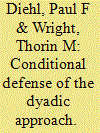

|
|
|
|
|
| Summary/Abstract |
We contend that the dyadic approach should be employed as a theoretically informed choice. All choices of units in modeling are simplifying. Current criticisms do not render dyadic approaches useless forms of simplification. Indeed, depending on the question and theory, dyadic approaches may be the most appropriate simplification of reality for scholars of international studies. The basic structure of the dyad, a two actor interaction, remains a useful simplification for multiple key questions in conflict research. As such, we offer a conditional defense of the dyadic approach in light of three elements: (i) the choice of level of analysis, (ii) the assumption of independence of cases, and (iii) the benefits accrued by past dyadic research.
|
|
|
|
|
|
|
|
|
|
|
|
|
|
|
|
| 2 |
ID:
146205


|
|
|
|
|
| Summary/Abstract |
Dyadic research designs concern data that comprise interactions among actors. They are, without a doubt, the most frequent designs employed in the empirical analysis of international politics. But what do such designs carry with them in terms of theoretical claims and statistical problems? These two issues closely intertwine. When testing hypotheses empirically, the statistical model must be a careful operationalization of the theory under consideration. Given that the theoretical and statistical cannot be separated, we discuss dyadic research designs from these two perspectives. We highlight problems of model misspecification, erroneous assumptions about the independence of events, artificial levels of analysis, and the incoherent treatment of multilateral/multiparty events on the theoretical side. On the statistical side, we stress difficult-to-escape challenges to valid inference.
|
|
|
|
|
|
|
|
|
|
|
|
|
|
|
|
| 3 |
ID:
146198
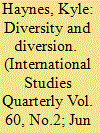

|
|
|
|
|
| Summary/Abstract |
How does a state’s ethnic composition affect its propensity to engage in diversionary conflicts? Recent empirical work examines the political conditions under which domestic unrest compels an embattled leader to initiate conflict abroad. We remain uncertain, however, of what social or demographic characteristics make states particularly prone to diversionary behavior. This article tries to address this gap, examining whether a state’s ethnic structure conditions its leader’s response to domestic discontent. Combining the expansive literatures on ethnic politics and diversionary war yields conflicting expectations here. I find that ethnically fragmented states are significantly more prone to initiating diversionary conflicts, and I show that the greater availability of “conflict opportunities” resulting from transborder ethnic-kin groups, in part, drives this effect. A brief case study illustrates these dynamics.
|
|
|
|
|
|
|
|
|
|
|
|
|
|
|
|
| 4 |
ID:
146200
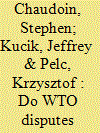

|
|
|
|
|
| Summary/Abstract |
Exporters, trade lawyers, policy makers, and academics see the WTO's Dispute Settlement Understanding as an important, though costly, venue for facilitating the removal of harmful barriers to trade. If this conventional wisdom holds, then disputes should increase trade. We provide a careful analysis of trade flows in the wake of WTO disputes. We find that WTO disputes do not increase the respondent country's imports of the products at issue. Instead, our analysis shows very narrow effects from disputes. These depend on the dispute outcome and issue area. Although we find variation across countries in their responsiveness to disputes, no single explanation accounts for this variation. Our evidence casts doubt on arguments that dispute settlement promotes trade between members.
|
|
|
|
|
|
|
|
|
|
|
|
|
|
|
|
| 5 |
ID:
146201


|
|
|
|
|
| Summary/Abstract |
This article examines the trade effect of flexibility design features within preferential trading arrangements (PTAs). Using a gravity model of bilateral trade that incorporates multilateral trade resistance, we report three main results. First, unconstrained escape provisions undermine the effectiveness of PTAs when it comes to increasing trade. Second, adding some restrictions to these escape provisions more than offsets the negative effect of unconstrained escape, leading to more effective PTAs than those without escape options. Third, adding more restrictions beyond a certain point serves only to make PTAs less effective. Thus, both too much institutional flexibility and too much institutional rigidity reduces the ability of PTAs to promote trade. However, fitting these results to the descriptive data makes it appear that most PTAs would be even more trade effective if they included greater restrictions on the use of their escape provisions. Consequently, it appears that policymakers generally choose fewer escape restrictions than would be optimal in terms of trade performance.
|
|
|
|
|
|
|
|
|
|
|
|
|
|
|
|
| 6 |
ID:
146207
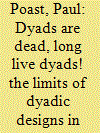

|
|
|
|
|
| Summary/Abstract |
Time and again, methodologists wrote papers with the potential to kill off dyadic designs in international relations research, only to pull back and—so long as one adopted the appropriate “tweak”—grant dyads a reprieve. Depending on the research question under consideration and the theoretical claims being evaluated, dyadic designs can provide valuable empirical insights. But these insights remain contingent on the researcher attempting to account for the limitations of dyadic data. To make this point, I concentrate on two difficulties for dyadic designs: the problem of interdependence and the problem of multilateral events. Drawing from empirical research on treaties and international organizations, I argue that a researcher need not abandon dyadic data so long as the researcher faces the former problem.
|
|
|
|
|
|
|
|
|
|
|
|
|
|
|
|
| 7 |
ID:
146195


|
|
|
|
|
| Summary/Abstract |
For decades, practitioners and academics sought to identify a common terrorist “profile.” However, the consensus in both the policy realm and academia suggests that, so far, these efforts produced only modest insights. This research note identifies and addresses a major impediment to previous studies of terrorist profiles: conceptualization. We argue that ambiguities in the definition of the term terrorist lead to an inconsistent and aggregated operationalization in the existing literature. Previous studies attempt to identify the factors correlated with a willingness to commit violence rather than the factors that correlate with the willingness to join an organization that commits violence. We test our claim by disaggregating the roles and responsibilities of members of various Islamist terrorist networks. We provide initial evidence that disaggregation presents a promising first step toward identifying specific profiles for different types of terrorists.
|
|
|
|
|
|
|
|
|
|
|
|
|
|
|
|
| 8 |
ID:
146196


|
|
|
|
|
| Summary/Abstract |
Military successes present war leaders with a choice between maintaining their existing aims and strategy and changing one or the other to extend their gains or make the war cheaper. “Staying the course” minimizes the risk of failure but also foregoes possible gains. Making a change increases the risk of failure but leaves nothing on the table. I argue that emotional responses—particularly contentment and joy—account for leaders’ preferences for changing or maintaining their approach to war. Joy, elicited by novel good news, makes change more likely because it leads to the derogation of risks and obstacles. Contentment, elicited by expected good news, tends to produce resistance to change. I substantiate my claims through World War II-era case studies from Japan and the United States.
|
|
|
|
|
|
|
|
|
|
|
|
|
|
|
|
| 9 |
ID:
146194
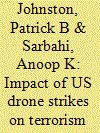

|
|
|
|
|
| Summary/Abstract |
This study analyzes the effects of US drone strikes on terrorism in Pakistan. We find that drone strikes are associated with decreases in the incidence and lethality of terrorist attacks, as well as decreases in selective targeting of tribal elders. This matters for key ongoing debates. Some suggest that drone strikes anger Muslim populations and that consequent blowback facilitates recruitment and incites Islamist terrorism. Others argue that drone strikes disrupt and degrade terrorist organizations, reducing their ability to conduct attacks. We use detailed data on US drone strikes and terrorism in Pakistan from 2007–2011 to test each theory’s implications. The available data do not enable us to evaluate if drone strikes resulted in increased recruitment, but the data do allow us to examine if these strikes resulted in changes in terrorist activities. While our findings do not suggest long-term effects, the results still lend some credence to the argument that drone strikes, while unpopular, bolster US counterterrorism efforts in Pakistan.
|
|
|
|
|
|
|
|
|
|
|
|
|
|
|
|
| 10 |
ID:
146204


|
|
|
|
|
| Summary/Abstract |
To travel undetected by state authorities and criminal predators, Central Americans pass as Mexican during their journey to the United States. This ‘passing’ underscores the ambiguities of social roles, such as nationality. Over time, these performances partially reconstruct imagined communities, blurring the boundaries between foreigners and citizens. However, international-relations scholarship tends to overlook how uncoordinated everyday practice complicates borders in a globalized world. By tracing the co-constitutive relationship between migration policing, national performances, and transnational routes, this article reveals the makeshift nature of the identities that underscore distinctions between citizens and foreigners. I argue for the continued inclusion of ethnography as a method for exploring the dynamic relationship between territory, state, and nation. Migrants complicate borders, but also suffer the very real, material consequences of both state and nonstate violence. My analysis of clandestine transnationalism therefore chronicles challenges to, and reconfigurations of, sovereignty.
|
|
|
|
|
|
|
|
|
|
|
|
|
|
|
|
| 11 |
ID:
146199


|
|
|
|
|
| Summary/Abstract |
This study identifies 37 central banks that added China’s renminbi (RMB) to their reserve portfolio since 2010. Why do some states diversify into new reserve currencies at an early stage while most continue to take a wait-and-see approach? We argue that state preferences regarding international order influence decisions to invest in RMB. While some states support the liberal, US-led status quo, others prefer an emerging Chinese alternative order. We contend that as state preferences for international order move away from the US model (and toward China), the likelihood of diversifying reserves into RMB should increase. Thus, the decision to invest in RMB is not simply an economic choice. It is also a political act that signals and symbolizes a state’s preferences for a diminution of American global influence and support for a revised order. Employing new United Nations General Assembly (UNGA) ideal points data, we find that states with larger (smaller) ideal point distance with the United States (China) are more likely to adopt RMB as a reserve currency. Furthermore, political consideration—rather than economic concerns about transaction needs, optimal portfolio considerations, or instrumental calculations—best explains emergent demand for the RMB as a reserve currency.
|
|
|
|
|
|
|
|
|
|
|
|
|
|
|
|
| 12 |
ID:
146203
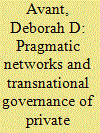

|
|
|
|
|
| Summary/Abstract |
In 2004 private military and security companies lacked effective transnational governance. Ten years later, however, an agreed-upon framework drew these services within established international law. It inspired various complementary non-binding instruments and instigated changes in government policy. Hegemonic-order theories, whether realist or liberal, would expect this change to reflect shifts in US preferences. But the United States displayed no initial interest in transnational coordination. I build an alternative explanation from pragmatism and network theory. A Swiss-led process created connections among stakeholders around the problem of regulating private military and security companies. Relatively open interactions among participants spurred original ideas, which in turn appeared useful for addressing the issue. Their usefulness, led more actors to “buy into” the process. This relational-pragmatic account offers new ways for understanding the nature and development of governance.
|
|
|
|
|
|
|
|
|
|
|
|
|
|
|
|
| 13 |
ID:
146197
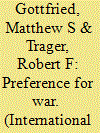

|
|
|
|
|
| Summary/Abstract |
We conduct a survey experiment to examine the effects of international compromise, war, and foreign government rhetoric on presidential approval. We find that, in certain conflicts, popular approval tracks fairness heuristics—leaders seeking to maximize voter approval prefer equitable divisions of disputed goods and are risk acceptant for divisions below this threshold. Moreover, aggressive rhetoric by a foreign leader increases domestic leaders’ expected approval from war, decreases the value of compromise, and provides them with powerful incentives to fight harder. Thus, leaders motivated by popular approval have preferences that are inconsistent with the non-satiated, risk-averse preferences defined over shares of an objective good—that is, with those that much of the rationalist literature on conflict assumes. Fairness heuristics and the rhetorical framing of disputes during the conflict process may be at least as important as material factors in understanding why some disputes result in war.
|
|
|
|
|
|
|
|
|
|
|
|
|
|
|
|
| 14 |
ID:
146202


|
|
|
|
|
| Summary/Abstract |
When AIDS activists launched their campaign for developing world access to antiretroviral therapy in the late 1990s, this treatment cost on average $10,000 per patient per year. More than a decade later, drug prices for “first line” therapies hovered around $100 per patient per year, and nearly 13 million people in low- and middle-income countries were receiving these life-extending medications. By contrast, climate activists during the same time period labored without much success in establishing mechanisms to put a price on carbon. We identify the global market structures most conducive for social movement-led market transformations. We argue that advocacy collective action is more likely to be successful when the global market structure involves (i) a small number of product markets, (ii) globally integrated product markets, (iii) a relatively concentrated industry with few producers or buyers, and (iv) a source of rents produced through social construction rather than natural or technological barriers to entry.
|
|
|
|
|
|
|
|
|
|
|
|
|
|
|
|
| 15 |
ID:
146193
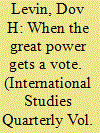

|
|
|
|
|
| Summary/Abstract |
What are the electoral consequences of attempts by great powers to intervene in a partisan manner in another country’s elections? Great powers frequently deploy partisan electoral interventions as a major foreign policy tool. For example, the U.S. and the USSR/Russia have intervened in one of every nine competitive national level executive elections between 1946 and 2000. However, scant scholarly research has been conducted about their effects on the election results in the target. I argue that such interventions usually significantly increase the electoral chances of the aided candidate and that overt interventions are more effective than covert interventions. I then test these hypotheses utilizing a new, original dataset of all U.S. and USSR/Russian partisan electoral interventions between 1946 and 2000. I find strong support for both arguments.
|
|
|
|
|
|
|
|
|
|
|
|
|
|
|
|
|
|
|
|
|